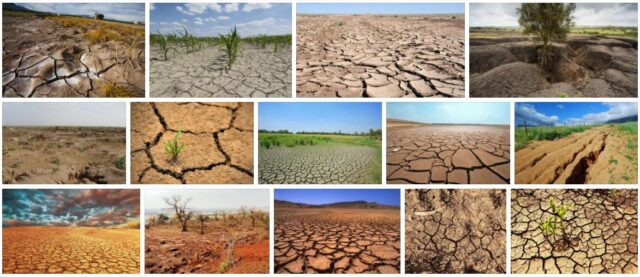It can be said that soils degrade in two main ways: naturally , as a result of the action of nature, and by human interference .
In the first case, technical knowledge can help to avoid the consequences of natural disasters, through preventive attitudes, in addition to altering mineral constituents of soils by means of agricultural corrective measures. In the second, knowledge establishes the importance of the continuity of land use as a vital priority, in a healthy and sustainable way, abandoning the idea of predatory use, typical of immediate and inconsequential profit.
Natural factors of soil degradation
Leaching
The most important degradation of soils by natural occurrence is due to excessive washing of surface layers by rainwater, a phenomenon called leaching , typical of tropical regions of the planet.
The rainwater drains through the soil, taking nutrients and minerals with it, which makes it less fertile. In general, these nutrients are carried to lower regions of the relief or to rivers and springs.
Laterization
The transport of soil nutrients through water infiltration or erosion , decreases their fertility, in addition to causing another phenomenon: laterization .
Laterization is the oxidation of soils by the accumulation of metals such as iron and aluminum, forming hardened shells, typical of tropical regions of the planet, such as Africa and Latin America. It is important to note that this phenomenon occurs due to the association between water and heat, therefore, soils exposed to the action of rainwater and sunlight are more attacked. Soils protected by vegetation cover suffer less from the action of nature.
Relief features
The characteristics of the relief can also associate some forms of degradation. The topography of the relief, when tilted, can be a facilitating agent of erosive processes, providing greater speed of runoff waters, causing gullies and landslides on the slopes.
However, undeniably, the greatest aggressions to soils are caused by human action.
Human factors of soil degradation
Population growth
In both urban and rural areas, there is a great lack of care in relation to the environmental impacts caused by population growth and economic development.
The cyclical needs, the lack of preventive policies and efficient inspection, exacerbate the problem mainly in underdeveloped countries.
Garbage
In urban centers, for example, soils are constantly attacked by the dumping of garbage in the open, without any technical care for their separation. Large amounts of organic waste, which could be an important source of resources (such as production of fertilizer and methane gas), ferment and deteriorate, producing leachate, which penetrates the soil and infiltrates groundwater, being transported by gravity to the water sources.
Logging
Peripheral subdivisions, carried out without planning in large urban centers, also add to the aggression against the soil. The deforestation of vast areas without any environmental impact study causes, in the short term, problems of silting up rivers and dams. That is, with the rains, soils previously protected by vegetation are exposed to erosive action, dumping large loads of sediment in these waters. Deforestation, chaotic urbanization and the misuse of agricultural land, with monocultures and extensive pastures, cause soil loss through erosion and a decrease in biological diversity.
The destruction of the riparian forests that accompany the beds of many Brazilian rivers is also a factor of aggression to the soil. These forests are true niches of life, in addition to protecting marginal regions from erosion. When devastated, soils lose their natural protection during floods, silting rivers with sediments carried by rain.
Burns
In rural areas, the lack of appropriate knowledge and the lack of supervision can turn the farmer into an aggressor. Burning, for example, a historical practice in Brazil, still continues to be carried out both by farmers who practice subsistence agriculture and by entrepreneurs who carry out commercial agriculture.
The fire, in spite of cleaning the land quickly, destroys the microorganisms of the superficial horizon of the soils, wearing it out. In addition, the CO 2 charge thrown into the atmosphere through smoke is a determining factor in accelerating the greenhouse effect.
Pesticides
The indiscriminate use of pesticides, some of which are prohibited in developed countries, is also harmful to soils. The pesticides penetrate into the groundwater, they are transported to the rivers and lakes and often take many years to deteriorate.
Excessive irrigation
Artificial irrigation assists agricultural production. However, when used in excess or for a long period, it produces soil alteration, which is due to the chemical weathering caused by water.
Soil depletion
The continuous use of soil for agricultural production without proper maintenance and replacement of nutrients causes the removal of organic matter, increasing the concentration of ferrous minerals and reducing the productive capacity of the soil.
